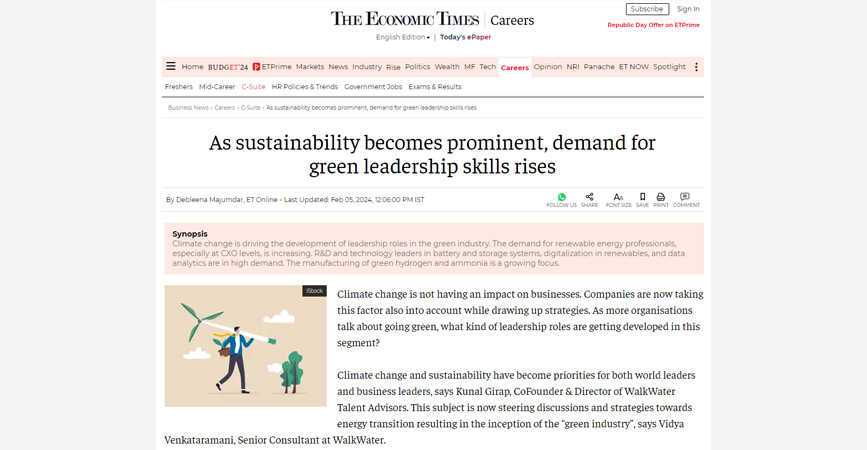
Synopsis: Climate change is driving the development of leadership roles in the green industry. The demand for renewable energy professionals, especially at CXO levels, is increasing. R&D and technology leaders in battery and storage systems, digitalization in renewables, and data analytics are in high demand. The manufacturing of green hydrogen and ammonia is a growing focus.
Climate change is not having an impact on businesses. Companies are now taking this factor also into account while drawing up strategies. As more organisations talk about going green, what kind of leadership roles are getting developed in this segment?
Climate change and sustainability have become priorities for both world leaders and business leaders, says Kunal Girap, CoFounder & Director of WalkWater Talent Advisors. This subject is now steering discussions and strategies towards energy transition resulting in the inception of the “green industry”, says Vidya Venkataramani, Senior Consultant at WalkWater.
Environmental, social and corporate governance (ESG) practices are now essential skills for leaders. Sustainability roles are evolving. “Chief sustainability officers, ESG officers, CSR heads, and experts in sustainable supply chain and operations are needed to drive culture change, shape long-term solutions, and ensure the organisation’s sustainability. In addition to the growing demand for renewable energy, electric vehicles (EVs), green finance and sustainable waste management in India, we anticipate a 60% increase in demand for sustainable leadership by 2024,” says Aditya Narayan Mishra, MD & CEO of CIEL HR.
Girap say, “At the forefront of the green industry are large sectors or players — the IPPs or power producers (solar, wind, biomass, hydro); the EV manufacturers along with battery and battery storage systems and charging infrastructure; and the manufacturers of electrolysers and green hydrogen/ammonia. At leadership levels, organisations are actively seeking renewable energy professionals, particularly at CXO levels. Candidates with diverse backgrounds in EPC, O&m, business development, engineering & design, experts in regulatory and policies within the solar and wind sectors are highly sought after. These leadership roles necessitate a profound understanding of the renewable sector, proficiency in P&L management, robust project execution and commissioning expertise, knowledge of tendering and bidding processes, and a sound understanding of financial models.”
Differences across sectors
Mishra says the requirements for green leadership roles vary across sectors. Whether it is renewable energy in utilities, supply chain sustainability in retail, or ESG integration in finance, green leaders must adapt to sector-specific challenges while achieving sustainability. This approach ensures that the organisation remains agile in its commitment to environmental and social responsibility while meeting the unique demands of its industry and stakeholders.
Girap and Venkataramani say there is an increasing demand for R&D and technology leaders in battery and battery storage systems, material sciences and with chemistry backgrounds. Another area gaining traction is digitalisation in the renewables space. The entire value chain of solar and wind energy operation is getting connected and data and analytics is becoming prominent and decisive.
Senior leaders in technology, cloud platforms, data science and data security will be in greater demand as more CXO roles will be open across the industry. Green hydrogen and ammonia production and manufacturing operations will be a major thrust area in the next few years. Such developments will require senior leaders in the manufacturing, supply chain & procurement, project management, experts in material sciences and chemical processes, primarily having experience in the process industries. Demand for global talent from developed economies will be on the rise.
Skills needed
According to Mishra, success in these roles hinges on a blend of sustainability knowledge, strategic thinking, data proficiency, innovation, agility and strong communication. Furthermore, expertise in supply chain management, a deep understanding of the circular economy, and effective stakeholder engagement are imperative for driving sustainability goals of the organisation.
Girap and Venkataramani say one of the major challenges would be availability of talent with relevant experience and background in some very specific areas such as solar PV module manufacturing, R&D talent in battery systems, electrolyser manufacturing, etc. The limited availability of talent pool at leadership levels in the renewable sectors is an area of concern. They either seem to have isolated experiences in solar or wind projects and lack cross-functional experience.
Source: The Economic Times








